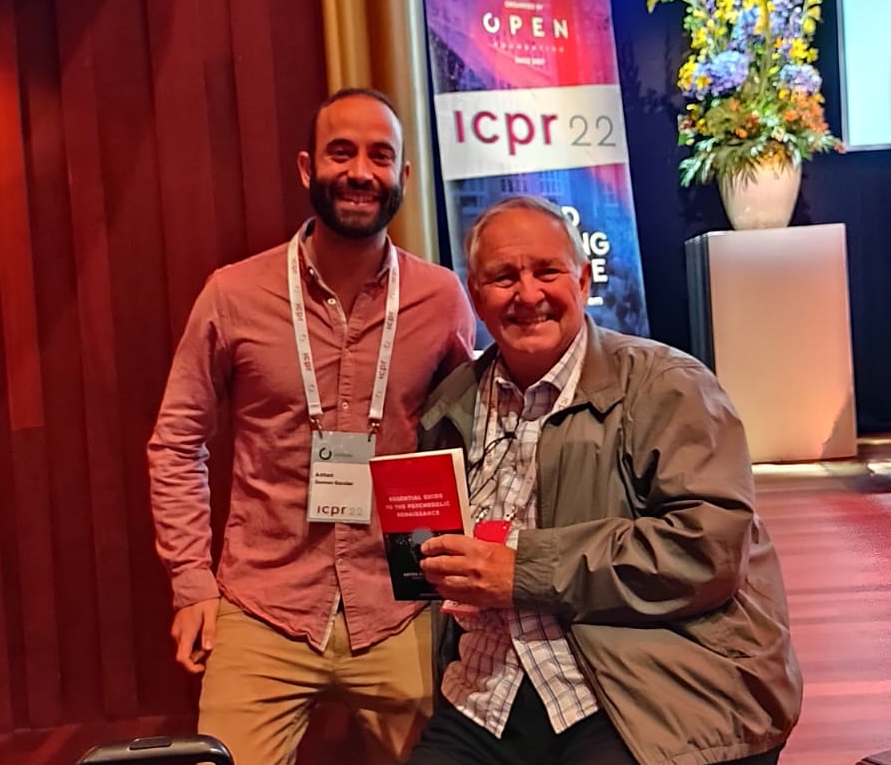By Gabriel García November 23, 2022
David Nutt is currently Edmond J. Safra Professor of Neuropsychopharmacology and Director of the Neuropsychopharmacology Unit in the Division of Brain Sciences.
After joining Bristol Grammar School, David obtained an open scholarship to Downing College, Cambridge and then completed his medical training at Guy’s Hospital, London, continuing in neurology to MRCP. After completing his psychiatric training at Oxford, he continued there as a lecturer and later as a Wellcome Senior Fellow in psychiatry. He then spent two years as Chief of the Clinical Sciences Section at the NIH National Institute on Alcohol Abuse and Alcoholism in Bethesda, USA. On his return to England in 1988, he set up the Psychopharmacology Unit at the University of Bristol, an interdisciplinary research group spanning the Departments of Psychiatry and Pharmacology, before moving to Imperial College London in December 2008, where he leads a similar group with a particular focus on brain imaging, especially PET.
David is currently chairman of Drug Science, formally the Independent Scientific Committee on Drugs (ISCD) and chairman of the European Brain Council. He has previously served as president of the European College of Neuropsychopharmacology (ECNP), the British Neuroscience Association (BNA) and the British Association of Psychopharmacology (BAP). In addition, he is a Fellow of the Royal Colleges of Physicians and Psychiatrists and a Fellow of the Academy of Medical Sciences. He is also the UK director of the European Certificate and Masters courses in Affective Disorders and a member of the International Centre for Science in Drug Policy. He has edited the Journal of Psychopharmacology for more than two decades and is a consultant on psychiatric drugs to the British National Formulary. He has published over 400 original research articles, a similar number of reviews and book chapters, eight government reports on drugs and 27 books.
He has previously been a member and then chair of the Advisory Committee on the Misuse of Drugs (ACMD - 1998-2009), a member of the HEFCE/NHS Senior Faculty Selection Panel and the MRC Neuroscience Council. Other previous national contributions include serving as a medical expert on the Independent Inquiry into the Misuse of Drugs Act (Runciman report 2000), and serving on the Medicines Safety Committee, the NHS Medicines Committee and the Ministry of Defence Scientific Advisory Board. He was the clinical scientific director of the 2004⁄5 UK Government Foresight initiative “Brain Science, Addiction and Drugs”, which provided a 25-year vision for this area of science and public policy.

His roles in the political and legislative arenas were important in sparking the beginning of the increasingly well-known psychedelic renaissance. In keeping with this psychedelic renaissance, we can find him pictured here with Anton Gomez-Escolar with the English version of the Essential Guide to the Psychedelic Renaissance at ICPR 2022. This book discusses the history, neuroscience, legality, therapeutic applications and harm reduction of the most promising psychedelic drugs for science. After decades of international prohibition, these molecules are returning to laboratories and clinics, hand in hand with the most rigorous science, to revolutionize the way we understand and treat mental health (depression, anxiety, PTSD and addictions).
Precisely on the legislative level, this title, along with the rest of the Psychonaut’s Guides collection, is one of the most up-to-date written sources on the legislative status of psychedelics for which Amanda Feilding has fought so hard. The appendix on legality, written by Francisco Azorín (a lawyer specialized in drugs and psychedelics), clearly answers the most relevant doubts about the current legislation and raises questions about its future.
Today David makes numerous broadcasts to the general public, both on radio and television, including BBC public affairs and scientific programs on therapeutic and illicit drugs, their harms and classification. He also lectures to the public and to the scientific and medical communities; for example, he has appeared three times at the Cheltenham Science Festival and several times at Café Scientifiques. In 2010 the scientific magazine The Times Eureka included him among the 100 most important figures in British science, being the only psychiatrist.
If you are interested in learning how these substances can help improve your mental health, you can read more information about psychedelics in the Essential Guide to the Psychedelic Renaissance,as well. We also recommend Psychedelics and Mental Health, by Irene de Caso and Your Brain on Psychedelics, by Genís Oña, where you will learn the keys to the effects of psychedelics, capable of producing significant changes in the processes of perception, thought and consciousness. The book also includes a prologue written by one of the greatest eminences in this field, José Carlos Bouso, scientific director of ICEERS.

These books are now available on Amazon in physical and eBook format, as well as Apple Books. In addition, all titles are available in Spanish version on GuiasdelPsiconauta.com





